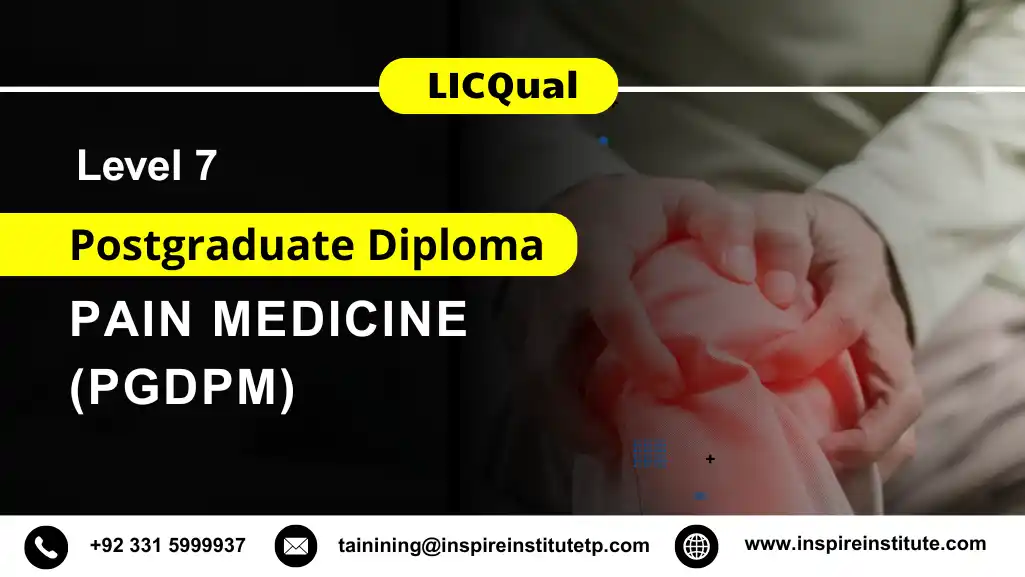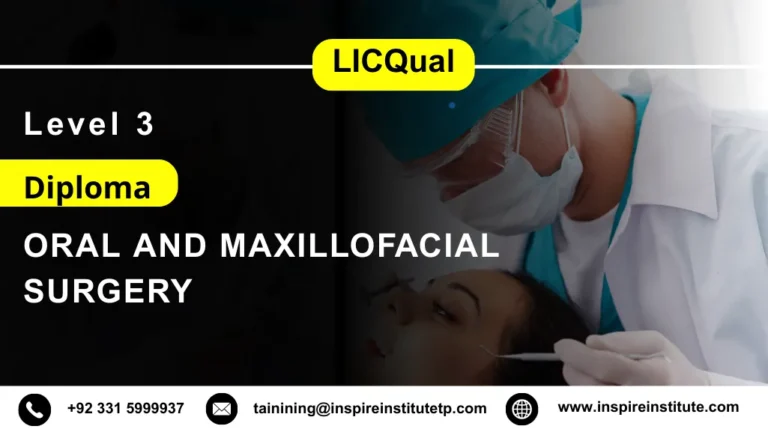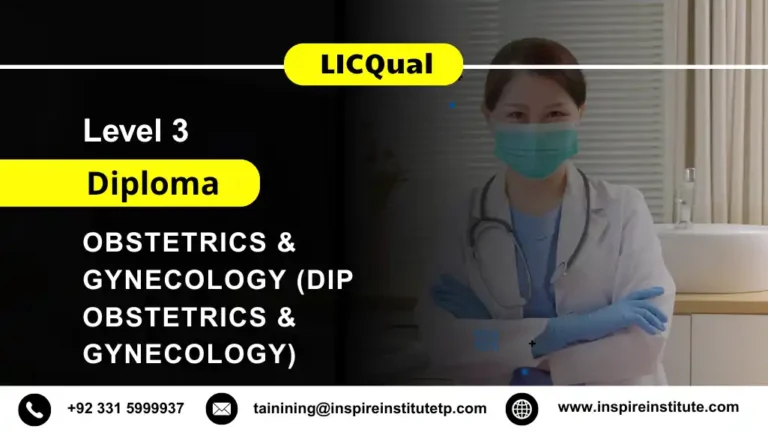LICQual Level 7 Postgraduate Diploma in Pain Medicine (PgDPM)
The LICQual Level 7 Postgraduate Diploma in Pain Medicine (PgDPM) is an advanced UK-accredited qualification designed for medical professionals, clinicians, and healthcare practitioners who wish to specialise in the diagnosis, management, and treatment of acute and chronic pain. Pain medicine is a rapidly growing field that plays a vital role in improving patient well-being and quality of life. This postgraduate diploma provides learners with a comprehensive understanding of pain mechanisms, pharmacological and non-pharmacological management strategies, and the multidisciplinary approaches essential for effective patient care.
This Level 7 Postgraduate Diploma in Pain Medicine integrates the latest scientific research with clinical practice, allowing learners to explore pain physiology, neuropathic pain, musculoskeletal disorders, and interventional pain procedures. The course equips students with evidence-based knowledge to assess, diagnose, and manage complex pain conditions using modern and patient-centred approaches. It ensures that graduates can deliver compassionate and competent care in hospitals, rehabilitation centres, and private practices.
The LICQual PgDPM qualification emphasizes both theoretical and applied aspects of pain management. Learners will develop clinical expertise in pain assessment tools, treatment planning, and multimodal pain control strategies. The course also focuses on ethical decision-making, patient safety, and communication skills—critical components for improving clinical outcomes in pain medicine. Graduates will gain the confidence to apply advanced clinical reasoning and critical analysis in real-world healthcare settings.
Why Choose this Qualification
The LICQual Level 7 Postgraduate Diploma in Pain Medicine (PgDPM) is a UK-accredited, advanced qualification designed for healthcare professionals who aim to specialize in the effective management and treatment of pain. This postgraduate diploma provides an in-depth understanding of pain mechanisms, diagnostic approaches, and evidence-based treatment methodologies. With a strong focus on clinical competence, research, and multidisciplinary practice, this qualification empowers learners to deliver high-quality patient care and contribute to innovation in modern pain management.
Key Reasons to Choose this Qualification
1. Comprehensive Understanding of Pain Medicine
- Gain in-depth knowledge of pain physiology, pathophysiology, and assessment methodologies.
- Explore the biopsychosocial model of pain and its relevance in clinical practice.
- Learn to distinguish between acute, chronic, and neuropathic pain conditions.
- Develop expertise in pharmacological and interventional pain management strategies.
2. Evidence-Based and Research-Driven Learning
- Engage with the latest clinical research and scientific developments in pain medicine.
- Learn to evaluate and apply clinical evidence in patient assessment and management.
- Develop critical appraisal and research analysis skills to support data-driven practice.
- Apply evidence-based approaches to improve patient safety and therapeutic outcomes.
3. Practical Clinical Application
- Gain practical competence through case-based learning and clinical simulations.
- Learn to conduct comprehensive pain assessments using validated clinical tools.
- Build skills in multimodal and interventional pain therapies.
- Enhance ability to formulate individualized and ethical treatment plans.
4. Recognised and Accredited Qualification
- Achieve a UK-accredited Level 7 Postgraduate Diploma respected by medical institutions worldwide.
- Demonstrate advanced professional competence in pain medicine and patient management.
- Enhance career credibility and employability across healthcare and academic sectors.
- Align with international standards for postgraduate medical education and clinical excellence.
5. Multidisciplinary and Holistic Approach
- Learn to integrate pharmacological, psychological, and physical therapies in pain management.
- Collaborate effectively within multidisciplinary healthcare teams.
- Understand the role of psychosocial factors in chronic pain and rehabilitation.
- Develop the ability to deliver patient-centered, holistic care.
6. Flexible and Accessible Learning
- Study through an assignment-based and flexible structure ideal for working professionals.
- Access online learning materials, expert mentorship, and academic support anytime, anywhere.
- Balance professional commitments and academic growth through self-paced learning.
- Participate in interactive discussions, case reviews, and virtual workshops.
7. Career Advancement Opportunities
- Progress toward specialist roles such as Pain Consultant, Clinical Researcher, or Educator.
- Build leadership and management skills applicable in hospitals, clinics, and research centers.
- Use this qualification as a pathway to doctoral studies or advanced clinical certifications.
- Strengthen your professional profile in national and international healthcare settings.
8. Enhanced Patient Care and Clinical Impact
- Develop the ability to improve patient outcomes through evidence-based treatment.
- Learn to reduce pain-related disabilities and enhance quality of life.
- Master effective communication and consultation techniques for managing patient expectations.
- Contribute to innovation and best practices in global pain management.
The LICQual Level 7 Postgraduate Diploma in Pain Medicine (PgDPM) is an essential qualification for healthcare professionals dedicated to mastering pain assessment, diagnosis, and treatment. It combines academic rigor with practical skill development, ensuring learners are fully equipped to lead in clinical practice, research, and education. By completing this qualification, professionals not only elevate their expertise but also contribute meaningfully to improving patient care standards and advancing the discipline of pain medicine worldwide.gnised accreditation to enhance careers and elevate standards of care in aesthetic medicine worldwide.nd healthcare excellence globally.
Course Overview
LICQual UK Awarding Body
Average Completion Time:
6-24 Months
Study Units: 6 Units
Evidence & Assignment Based
Mandatory Units
Who Should Take This Course
The LICQual Level 7 Postgraduate Diploma in Pain Medicine (PgDPM) is specifically designed for medical and healthcare professionals who aspire to specialize in the assessment, diagnosis, and management of pain in diverse clinical settings. This qualification provides a strong academic foundation and practical framework for understanding complex pain mechanisms, developing advanced therapeutic interventions, and enhancing patient care. Learners gain critical, analytical, and decision-making skills that prepare them to deliver evidence-based pain management solutions in multidisciplinary environments.
This Course is Suitable For
1. Medical Doctors and Physicians
- Ideal for general practitioners, anaesthetists, neurologists, and orthopaedic specialists managing patients with acute or chronic pain.
- Learn to apply advanced diagnostic and pharmacological strategies for pain control.
- Strengthen clinical expertise in neuropathic, musculoskeletal, and postoperative pain management.
- Gain the ability to integrate medical, psychological, and interventional therapies for comprehensive patient care.
2. Dentists and Oral Health Specialists
- Suitable for professionals involved in orofacial pain, temporomandibular joint disorders, and nerve-related pain.
- Acquire skills to diagnose and treat complex dental and facial pain conditions.
- Understand the neurological and muscular origins of pain in dental practice.
- Learn to collaborate with medical specialists for holistic pain management in oral health.
3. Nurses and Nurse Practitioners
- Designed for registered nurses who wish to expand their clinical scope in pain assessment and management.
- Develop skills to monitor, evaluate, and implement multidisciplinary pain care plans.
- Gain confidence in administering analgesics and managing patient comfort and safety.
- Learn to educate patients and families about pain management strategies and self-care.
4. Physiotherapists and Rehabilitation Specialists
- Perfect for professionals working with musculoskeletal disorders, chronic pain, and post-surgical recovery.
- Understand the mechanisms of pain perception and neuromuscular dysfunction.
- Learn evidence-based rehabilitation and pain modulation techniques.
- Enhance collaboration with clinicians for multidimensional and long-term patient recovery.
5. Pharmacists and Clinical Pharmacologists
- Suitable for pharmacists interested in pain pharmacotherapy and medication optimization.
- Learn to analyze drug interactions, opioid management, and novel analgesic approaches.
- Gain expertise in rational prescribing and patient-specific dosage adjustments.
- Contribute to interdisciplinary pain management teams through informed pharmacological input.
6. Psychologists and Mental Health Practitioners
- Ideal for psychologists focusing on the psychological and behavioral aspects of pain.
- Explore the relationship between chronic pain, anxiety, depression, and coping mechanisms.
- Learn to apply cognitive-behavioral and mindfulness-based interventions for pain relief.
- Integrate mental health strategies into multidisciplinary treatment frameworks.
7. Allied Health Professionals and Therapists
- Suitable for occupational therapists, chiropractors, osteopaths, and alternative medicine practitioners.
- Gain insight into pain mechanisms and non-invasive therapeutic approaches.
- Learn to evaluate patient function and design rehabilitation strategies.
- Develop a collaborative approach to long-term pain management and wellness.
8. Clinical Researchers and Educators
- Designed for professionals involved in academic research or clinical education.
- Learn to conduct and evaluate pain-related studies with scientific accuracy.
- Gain skills to develop training modules and mentorship programs for clinical teams.
- Contribute to advancing knowledge and innovation in pain medicine through scholarly research.
The LICQual Level 7 Postgraduate Diploma in Pain Medicine (PgDPM) is a globally relevant qualification that equips a wide range of healthcare professionals with the expertise to address pain holistically and effectively. Whether you are a clinician, researcher, or educator, this programme empowers you to enhance your professional competence, promote patient well-being, and advance evidence-based practice in the evolving field of pain management.ing, and patient safety. Graduates gain the knowledge, practical skills, and professional recognition to succeed in competitive aesthetic medicine environments worldwide.
Course Benefits
The LICQual Level 7 Postgraduate Diploma in Pain Medicine (PgDPM) is a prestigious UK-accredited qualification designed for medical practitioners, healthcare professionals, and clinicians dedicated to advancing their expertise in the field of pain assessment, management, and rehabilitation. This comprehensive, assignment-based postgraduate programme integrates theoretical depth with clinical practice, equipping learners to deliver evidence-based, multidisciplinary pain management solutions. Through a flexible and research-informed curriculum, this qualification prepares professionals to enhance patient care, improve clinical outcomes, and contribute to innovations in pain medicine and healthcare delivery.
Key Benefits of the Course
Specialist Knowledge
- Gain an in-depth understanding of the neurophysiology of pain, pain pathways, and mechanisms of chronic and acute pain.
- Explore pharmacological, interventional, and psychological approaches to pain management.
- Understand clinical pain assessment techniques, diagnostic criteria, and patient-centred care planning.
- Learn about opioid stewardship, non-opioid alternatives, and multimodal pain management strategies.
- Develop knowledge of ethical, professional, and legal frameworks guiding modern pain medicine practice.
Practical Application
- Strengthen clinical expertise through case studies, simulations, and applied assignments.
- Learn to evaluate patient history, conduct pain assessments, and design personalised management plans.
- Practice safe and effective application of interventional procedures and rehabilitation techniques.
- Apply knowledge to multidisciplinary pain management models and holistic treatment pathways.
- Develop competence in patient communication, documentation, and outcome measurement.
Recognised Qualification
- Earn a UK-accredited Level 7 Postgraduate Diploma in Pain Medicine, signifying advanced professional achievement.
- Gain an internationally recognised credential valued in clinical, academic, and research sectors.
- Ensure alignment with global standards in evidence-based pain management and clinical excellence.
- Enhance professional credibility and employability in pain clinics, hospitals, and medical institutions.
- Position yourself as a specialist in pain medicine capable of influencing modern healthcare practice.
Flexible Learning Pathway
- Designed for working medical professionals seeking a balance between education and career commitments.
- Delivered through an assignment-based, self-paced model with structured academic support.
- Access interactive online learning resources, case-based discussions, and expert mentorship.
- Participate in collaborative forums and clinical learning activities to reinforce theoretical knowledge.
- Benefit from a flexible study plan tailored to your professional and personal schedule.
Evidence-Based Training
- Engage with current clinical research, global guidelines, and best practices in pain medicine.
- Learn to critically analyse and apply evidence to improve patient outcomes.
- Develop competence in interpreting pain-related research and implementing validated therapies.
- Understand risk assessment, safety standards, and adverse event management in clinical settings.
- Stay updated with emerging innovations in pain diagnostics, treatment, and technology.
Career Development
- Expand career opportunities in pain management clinics, hospitals, academia, and healthcare leadership.
- Qualify for specialist roles such as Pain Consultant, Clinical Educator, Researcher, or Healthcare Manager.
- Build skills for clinical governance, team leadership, and interprofessional collaboration.
- Access pathways for doctoral research or further specialisation in pain science or related disciplines.
- Establish a foundation for consultancy and teaching roles in advanced pain management.
Enhanced Patient Impact
- Deliver safe, ethical, and patient-centred pain care tailored to individual needs.
- Improve patient outcomes through comprehensive assessment and evidence-based interventions.
- Foster trust, empathy, and long-term patient engagement in managing chronic pain conditions.
- Implement multidisciplinary and sustainable care strategies for lasting relief and rehabilitation.
- Contribute to improving patient quality of life through innovation and compassion in clinical practice.
Professional Growth
- Strengthen critical thinking, analytical reasoning, and reflective practice in pain medicine.
- Develop leadership and communication skills for effective healthcare delivery.
- Gain expertise in multidisciplinary teamwork and advanced clinical decision-making.
- Cultivate confidence and autonomy in performing complex clinical assessments and interventions.
- Emerge as a competent leader and innovator capable of shaping the future of pain management.
The LICQual Level 7 Postgraduate Diploma in Pain Medicine (PgDPM) empowers healthcare professionals with the essential expertise, research-driven insights, and clinical competence to address pain holistically and effectively. Graduates emerge as skilled specialists ready to transform patient care, influence healthcare innovation, and set new benchmarks in the evolving field of pain medicine.Dermatology equips healthcare professionals with advanced knowledge, clinical skills, and internationally recognised credentials. Graduates emerge as competent, confident practitioners ready to excel in cosmetic dermatology and aesthetic medicine
Eligibility Criteria
The LICQual Level 7 Postgraduate Diploma in Pain Medicine (PgDPM) is a prestigious UK-accredited qualification designed for medical practitioners, healthcare professionals, and clinicians aiming to advance their expertise in pain management, clinical research, and patient care strategies. This assignment-based postgraduate diploma bridges the gap between theory and clinical practice, preparing learners to assess, diagnose, and manage pain using evidence-based, multidisciplinary approaches.
Educational Background:
Applicants should hold a recognised medical qualification such as MBBS, BDS, or equivalent. Registered healthcare professionals including physicians, dentists, nurses, physiotherapists, and allied health practitioners with relevant clinical experience may also be eligible. Candidates with international medical degrees will undergo individual evaluation to ensure equivalence to UK academic and clinical standards.
Professional Experience:
A minimum of one year of experience in clinical practice, anaesthesiology, neurology, or pain management is recommended. Prior exposure to patient consultation, diagnostic evaluation, or interventional procedures offers an added advantage. Motivated practitioners with a strong commitment to advancing their knowledge in pain medicine, even without extensive prior experience, are also encouraged to apply.
Age Requirement:
Applicants must be at least 21 years old at the time of enrolment. This ensures that learners possess the necessary professional maturity, ethical awareness, and responsibility required for postgraduate-level study and clinical practice in pain medicine.
Language Proficiency:
As the LICQual Level 7 Postgraduate Diploma in Pain Medicine (PgDPM) is delivered entirely in English, learners must demonstrate proficiency in reading, writing, and communication. Non-native English speakers should hold a minimum IELTS score of 6.0 or equivalent, enabling them to engage effectively in assignments, discussions, and clinical documentation throughout the programme.
Technical Requirements:
Learners should have access to a computer or laptop with a stable internet connection to access digital resources, submit assignments, and participate in online discussions and simulations. Basic computer literacy skills, including research, data analysis, and document preparation, are essential for success in this postgraduate qualification.
Required Documents:
Applicants are required to provide the following documents at the time of registration:
A valid ID card or passport for identity verification.
Academic transcripts or certificates of previous qualifications.
Proof of professional registration or evidence of clinical experience in medicine, physiotherapy, nursing, or related healthcare fields (if applicable).
The LICQual Level 7 Postgraduate Diploma in Pain Medicine (PgDPM) sets a global benchmark for excellence in clinical education. It is ideal for professionals seeking to deepen their expertise, strengthen their evidence-based practice, and gain international recognition in the evolving discipline of pain management.
The Qualification Process
LICQual Level 7 Postgraduate Diploma in Pain Medicine (PgDPM) follows a structured pathway to ensure learners gain comprehensive knowledge, practical skills, and professional competence in community oral healthcare.
Step 1: Self-Assessment
Learners review the entry requirements to confirm eligibility. Candidates with a background in dentistry, oral health, or public health are encouraged to apply.
Step 2: Registration
Complete the registration process by submitting required documents such as proof of qualifications, a valid ID, and payment of enrollment fees.
Step 3: Induction
An induction session is conducted to:
- Verify learner eligibility and documentation.
- Introduce study materials, learning outcomes, and assessment procedures.
Step 4: Learning and Evidence Submission
Learners complete assignments, case studies, and practical exercises demonstrating competence in public health dentistry, community oral health assessment, preventive strategies, and program planning.
Step 5: Feedback and Revision
Assessors review submitted evidence and provide constructive feedback. Learners can revise and resubmit work to meet all required standards.
Step 6: Competence Validation
Final submissions are evaluated to confirm that learners have met all theoretical and practical learning outcomes.
Step 7: Internal Quality Assurance (IQA)
The IQA team reviews the assessment process to ensure accuracy, fairness, and compliance with international standards.
Step 8: External Verification (EQA)
External verifiers validate the authenticity and quality of learner achievements.
Step 9: Certification
Upon successful verification, learners are awarded LICQual Level 7 Postgraduate Diploma in Pain Medicine (PgDPM), demonstrating advanced proficiency in community oral healthcare and preparing them for professional growth in dental public health, preventive dentistry, and healthcare policy.







